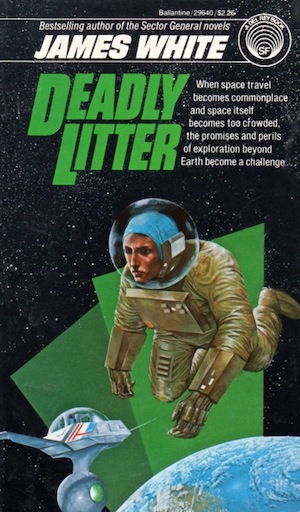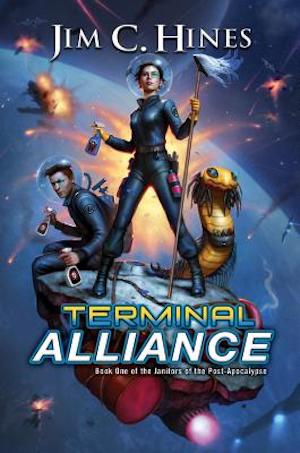If there is one lesson that the popular film Space Sweepers teaches us, it is that audiences worldwide love science fiction about garbage and garbage collection. SF fans eager for more thrilling tales of garbage collection will be overjoyed to learn that science fiction is rich with examples of prior art. Consider these five works…
Deadly Litter by James White (1959)

One hundred and fifty years of energetic space development prove that not only is there no frontier that humanity cannot eventually reach, but also that there are no pristine wildernesses that humans cannot sully with discarded trash. Space trash, moving as it does at the speed of meteorites, is far more deadly than the terrestrial variety. Discarding waste in space is illegal.
While it is impossible to eliminate all space-littering, simple Newtonian physics can implicate the culprits. Thus, the crew of Police Survey Ship Descartes traces the sudden violent deaths of eighteen men on their wrecked spacecraft to the actions of the crew of the Sunflower eleven years earlier. If further deaths are to be avoided, Descartes needs to determine the precise orbit of the so-called “Sunflower Drift.” Former Sunflower engineer James Andrew Caulfield could provide the clues needed… if he could even remember the catastrophic events of eleven years past.
***
Quark (TV series), created by Buck Henry (1977–1978)
Adam Quark (Richard Benjamin) commands a United Galaxy Sanitation Patrol Cruiser operating out of United Galaxies Space Station Perma One. It’s an unpleasant but necessary task, complicated by the fact that Quark has a boss who is both craven (when dealing with superiors) and bullying (when dealing with underlings like Quark). As often as not, Quark and his crew find themselves dealing with crises well beyond their paygrade, crises that are suspiciously similar to the plots of famous SF television episodes and movies.
Assisting Quark is a diverse array of clones, robots, and aliens, each of whom did their best to show just how badly comedy can age in just forty-odd years.
***
Planetes by Makoto Yakimura (1999–2004)

Thanks to inexpensive lunar Helium-31, space from low Earth orbit to the Moon has been heavily industrialized. As human populations soar, so too does the amount of debris in space—bad news for anyone who gets in the way of a Mach 30 bolt. Just ask Yuri Mihairokov’s wife—except you can’t, because her space shuttle was struck by debris and her body was never recovered.
The crew of the DS-12—Hachirota “Hachimaki” Hoshino, Yuri Mihairokov, Ai Tanabe, and Fee Carmichael—are among the stalwarts of Technora Corporation’s Space Debris Section. They work tirelessly to control the space debris problem. Necessary is not the same as “valued,” however. The DS-12 crew may be lifesavers but to other space workers, they’re just the garbage collectors.
***
Terminal Alliance by Jim C. Hines (2017)

The Krakau found an Earth that has been overrun by the bestial survivors of a planetary plague. Still, better half a glass than an empty glass. The benevolent aliens retrieved suitable candidates from the raving hordes and applied suitable cognitive corrective measures. Lo and behold, humans were transformed from wandering monsters to trustworthy subordinates. Although perhaps not all that trustworthy. Humans are relegated to menial tasks.
Marion “Mops” Adamopoulos is in charge of Earth Mercenary Corps Ship Pufferfish’s Shipboard Hygiene and Sanitation team. Chief janitor, in other words. Not command crew. Except that an unexpected attack eliminates her Krakau commanders while most of Pufferfish’s humans revert into beasts. Mops has no choice but to take command of a ship neither she nor the remaining non-bestial humans know how to operate.
***
Orbital Cloud by Taiyo Fujii (2014)

Shooting-star-prediction site Meteor News is the first to notice the SAFIR 3’s booster rocket’s bizarre behaviour. Rather than re-entering and burning up, the Iranian rocket’s second stage is somehow, inexplicably, ascending towards higher orbit despite seemingly lacking the means to do so. How this is possible is unclear, as is the purpose in sending a seemingly expended rocket stage into low Earth orbit.
Ill-informed nincompoops panic over the possibility someone has orbited the first ever Rod from God, a potential hyperkinetic weapon. While the mysterious object is a kinetic weapon—forty thousand kinetic weapons, to be exact—the intended target is not on Earth itself. The rocket’s payload is targeting anything currently in Earth’s orbit. If an ad hoc international team cannot work out how to safely remove the weapon from orbit, forty thousand kinetic weapons will annihilate Earth’s satellites and space stations, filling the region near Earth with debris and ending space flight for the foreseeable future.
***
No doubt for each example I thought of, many of you can think of ten examples that you are astounded I did not mention. The comments are below!
In the words of Wikipedia editor TexasAndroid, prolific book reviewer and perennial Darwin Award nominee James Davis Nicoll is of “questionable notability.” His work has appeared in Publishers Weekly and Romantic Times as well as on his own websites, James Nicoll Reviews and Young People Read Old SFF(where he is assisted by editor Karen Lofstrom and web person Adrienne L. Travis). He is a four-time finalist for the Best Fan Writer Hugo Award and is surprisingly flammable.
[1]Sigh.











@Callahan: I only have fairly dim memories of Gardner Fox, mostly suppressed now, but yes, you only need to read one short story of his to get the idea. I mentioned Nick Lowe’s “The Well-Tempered Plot Device” on Niall Alexander’s latest British Genre Fiction post: since Gardner Fox is also mentioned in this peerless classic of literary criticism, I would advise that you read the original in Ansible 46 to fully appreciate the nuances of plotting in fantasy novels.
After reading a few Conan knockoffs, I generally avoided them, and certainly avoided this series when it came out. They all seemed to delight in going into detail about sex, which had previously been taboo, and made a point of mentioning not only that the women were scantily clothed, but also all seemed to compare women’s breasts to types of fruit. I always wondered if they were copying each other when they did this, or if this was some sort of literary (if that word is appropriate in this case) type of parallel evolution…
The name Gordon Fox rang a bell, though, and you answered the question why–even though we were primarily a Marvel household, we had quite a few DC comics as well, and I am sure I was exposed to his comics work.
Well, yeah, in The Sword of the Sorceror, after Kothar gets his Atlantean, um, old magic sword, the sorceress Red Lori is imprisoned in silver. I think it’s covered in Alchemy 101.
I like a world where getting a magic sword is a big deal, not just an expected perk of leveling; where you don’t throw your magic sword in the garbage or sell it off in town when you find an inevitable upgrade.
@@.-@: Inflation really hit the world of metallurgic sorcery hard. Back in the day, you had Excalibur, Glamdring, Tyrfing, Stormbringer and a couple of others. These days, it’s foundries as far as the eye can see…
One of the things I like about Goodman Games’ Dungeon Crawl Classics system — and I like a LOT about it — is that there’s no such thing as a Longsword +1. Every magic sword is a BIG DEAL, with a name and a personality and it is not something to be trifled with!
Fox, whatever else his strengths and weaknesses were, clearly was suffering from a nigh-terminal case of Dumb Name Syndrome. “Kothar” is marginally respectable, but “Afgorkon”? “Phronalom”? Sadly, it’s not an uncommon affliction.
But having said that, Kothar was able to roister in a tavern, steal from a wizard, enter an alternate dimension and fight a demon in fewer pages than some current authors would use to describe a not-very-elaborate meal.
@7: Kothar is apparently a West Semitic deity equivalent to Hephaestus, whose name approximately translates as “skill”. Pseudo-mythological names tend to sound better than completely fictional ones.
@9: Yes, unless you’re Jack Vance, Clark Ashton Smith or Lord Dunsany.